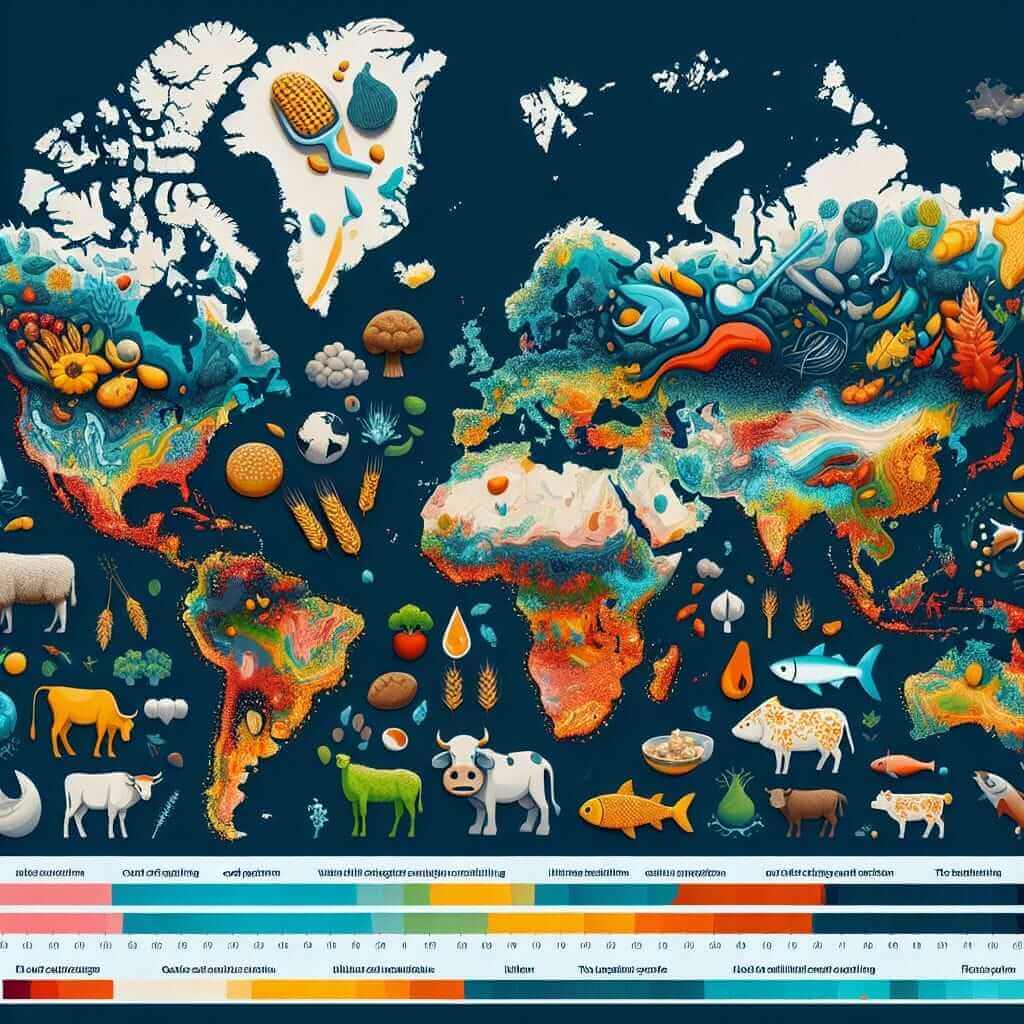The IELTS Reading module is an essential part of the IELTS test, designed to assess a candidate’s reading skills within a 60-minute time frame. Topics often revolve around current events, scientific breakthroughs, and global issues—making it crucial for candidates to stay informed on these subjects.
One such pertinent topic is climate change and its implications on global food systems. This topic has appeared in several past IELTS exams and is expected to continue appearing due to its increasing relevance. By mastering such topics, you not only enhance your reading skills but also enrich your knowledge about crucial global issues.
Main Content
Sample IELTS Reading Passage: Medium Text
The Implications of Climate Change on Global Food Systems
Climate change has far-reaching implications on various aspects of our world, especially on global food systems. As global temperatures rise and weather patterns become more erratic, food production and distribution face major challenges.
One of the most significant impacts of climate change on food systems is the alteration of crop yields. Elevated temperatures and changes in precipitation patterns can either shorten or lengthen growing seasons, affect soil fertility, and increase the prevalence of pests and diseases. For instance, warmer temperatures can enhance the growth of some crops, like wheat in colder regions, but often lead to reduced yields in already warm areas.
Moreover, extreme weather events such as floods, droughts, and hurricanes have become more frequent and severe due to climate change. These events can devastate entire crops, disrupt supply chains, and lead to food shortages. Countries heavily reliant on agriculture, especially in Africa and Southeast Asia, are particularly vulnerable to these disruptions.
Another crucial aspect is the effect on livestock. Heat stress, altered water supply, and changes in pasture composition affect livestock health and productivity. For example, dairy cows produce less milk when subjected to high temperatures, while fish and shrimp farming face challenges due to changing water temperatures and acidity levels.
Climate change also influences the nutritional quality of food. Elevated levels of carbon dioxide can reduce the protein and mineral content in staple crops like rice and wheat. This decline in nutritional value poses a threat to global health, especially in regions already facing malnutrition.
Finally, socioeconomic factors play a crucial role. Smallholder farmers, who constitute a significant portion of the farming community, have limited resources to adapt to climate change. They often lack access to advanced technology, forecasting information, and financial support. Consequently, these farmers are more likely to face crop failures and economic hardships.
In conclusion, the implications of climate change on global food systems are extensive and multifaceted. Addressing these challenges requires concerted efforts from governments, scientists, and communities to develop sustainable practices, improve crop resilience, and ensure food security for future generations.

Practice Questions
1. Multiple Choice
-
What is one of the main ways climate change affects livestock?
- A) Heat stress
- B) Enhanced growth
- C) Increased mineral content
- D) Improved milk production
-
Which factor is mentioned as a challenge specifically for smallholder farmers?
- A) Access to forecasting information
- B) High protein content
- C) Advanced irrigation systems
- D) Fish farming techniques
2. True/False/Not Given
- Climate change has an effect on the nutritional quality of food. (True)
- Fish farming is unaffected by climate change. (False)
- Large-scale farmers are more vulnerable to climate change than smallholder farmers. (Not Given)
3. Summary Completion
Complete the summary using NO MORE THAN TWO WORDS from the passage.
Climate change poses significant risks to the (1) of crops and livestock, especially in (2) regions relying heavily on agriculture. Moreover, the (3) nutritional quality of food due to elevated (4) levels is another notable concern.
Answer Keys
1. Multiple Choice
- A) Heat stress
- A) Access to forecasting information
2. True/False/Not Given
- True
- False
- Not Given
3. Summary Completion
- productivity
- vulnerable
- decreased
- carbon dioxide
Common Mistakes and Tips
- Misinterpreting Questions: Carefully read all answer choices and eliminate those that are clearly incorrect.
- Time Management: Allocate time wisely. Spend more time on passages that seem challenging and less on easier ones.
- Practicing Summary Completion: Focus on understanding the gist of the passage to fill in the blanks accurately.
Vocabulary
- Erratic (adjective) /ɪˈræt.ɪk/: irregular or unpredictable.
- Prevalence (noun) /ˈprev.əl.əns/: the state of being widespread.
- Devastate (verb) /ˈdev.ə.steɪt/: to destroy or ruin.
- Malnutrition (noun) /ˌmælˈnʊ.trɪ.ʃən/: lack of proper nutrition.
Grammar Focus
Complex Sentences: Practice constructing complex sentences using conjunctions like ‘although,’ ‘because,’ and ‘while.’
- Example: While increasing temperatures can benefit certain crops, they more often result in reduced yields in warmer areas.
Advice for High IELTS Reading Scores
- Regular Practice: Consistently practice with IELTS reading materials.
- Diverse Reading: Read a variety of texts on different subjects to improve language skills and gain knowledge on numerous topics.
- Timed Practice: Familiarize yourself with the time constraints by practicing under timed conditions.
- Review Mistakes: Always review incorrect answers to understand and learn from your mistakes.
By following these guidelines and utilizing the sample reading passage, you can enhance your chances of achieving a high score in the IELTS Reading section.